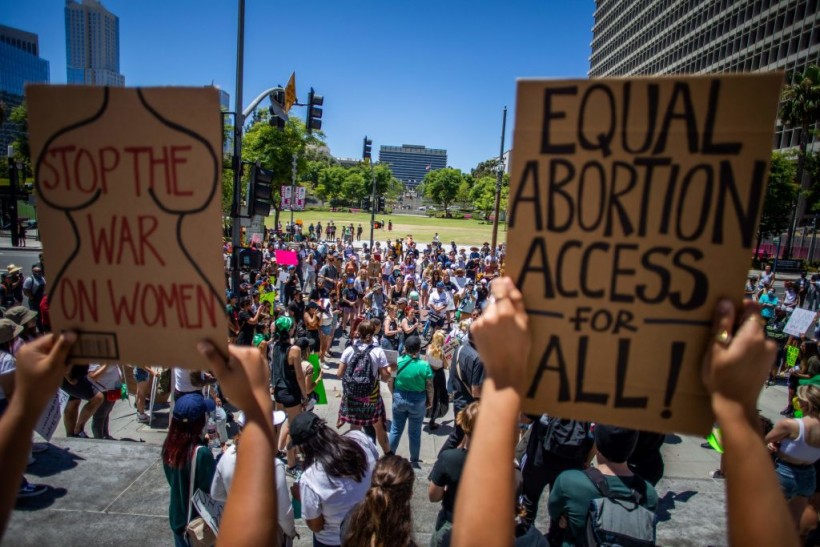
(Photo : APU GOMES/AFP via Getty Images)
People protest in front of the Los Angeles City Hall in downtown Los Angeles, on June 25, 2022, a day after the Supreme Court released a decision on Dobbs v Jackson Women's Health Organization, striking down the right to abortion. - Abortion rights defenders fanned out across America on June 25 for a second day of protest against the Supreme Court's thunderbolt ruling, as state after conservative state moved swiftly to ban the procedure.
A federal judge halted the implementation of two provisions of a near-total ban on abortions after 12 weeks of pregnancy in North Carolina on Saturday, stating that one is unconstitutionally imprecise and the other lacks medical evidence.
The "Care for Women, Children, and Families Act," Senate Bill 20, prohibits licensed physicians from performing abortions after the 12th week of pregnancy. It provides exceptions for rape and incest up to 20 weeks of pregnancy and for "life-limiting anomalies" up to 24 weeks of pregnancy.
Some North Carolina Abortion Ban Restrictions Lifted
On June 26, the American Civil Liberties Union (ACLU), Planned Parenthood, and physician Beverly Gray filed a lawsuit challenging the bill before it went into effect on July 1.
According to CNN, they argued that the bill's restrictions on abortion access will "harm patients and hinder health care professionals from providing care."
In an order issued on Saturday, US District Judge Catherine Eagles halted the enforcement of a provision requiring surgical abortions after 12 weeks to take place exclusively in hospitals as opposed to abortion clinics.
She said the plaintiffs demonstrated the state legislature's "absence of any rational medical basis" for the mandate scheduled to take effect on Sunday.
Before prescribing a medication abortion, the judge also blocked a provision requiring physicians to document the location of early pregnancies with ultrasound evidence. In the injunction, her order says the provision "does not provide a clear standard by which providers can make this determination" and is open to "differing interpretations."
Read Also: Texas Governor Belittles NYC Migrant Crisis, Claiming It's 'Calm' Compared to Theirs
North Carolina Abortion Ban Changes
In July, Judge Eagles issued a two-week restraining order against this provision to allow for additional review. Before the Republican supermajority overrode his veto in May, Gov. Roy Cooper vetoed a moratorium on most abortions after 12 weeks.
On July 29, the governor signed into law significant amendments to the moratorium, stating that the change was "important to elucidate the rules and provide some certainty."
Additionally, the state legislature, which the Republicans control, made additional last-minute modifications to the new abortion law by attaching them to House Bill 190, an unrelated bill pertaining to the Department of Health and Human Services.
Related Article: Montana Judge Temporarily Blocks Ban on Gender-Affirming Care for Minors









